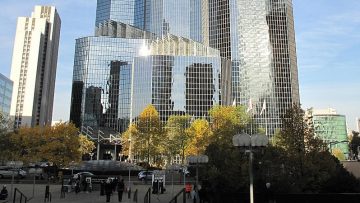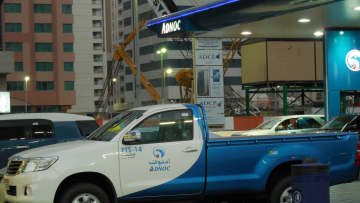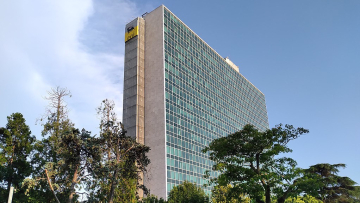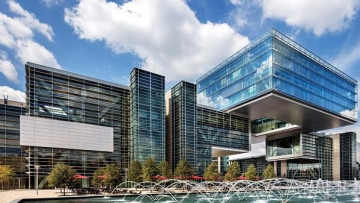New report on ADNOC’s partners in climate chaos: Banks and fossil fuel majors
Dr. Ognyan Seizov, International Communications Director, Urgewald @COP28, + 49 176 2311 2082
Helen Burley, International Media, Reclaim Finance, +44 7703 731923
Johan Frijns, Executive Director, BankTrack
Fatima Eisam Eldeen, Research Analyst, LINGO @COP28
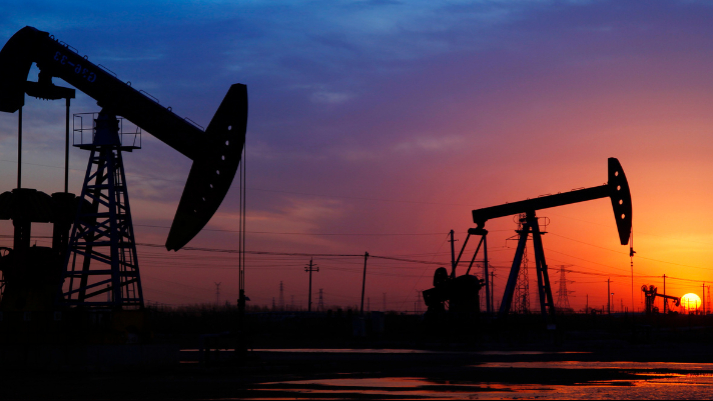
Dr. Ognyan Seizov, International Communications Director, Urgewald @COP28, + 49 176 2311 2082
Helen Burley, International Media, Reclaim Finance, +44 7703 731923
Johan Frijns, Executive Director, BankTrack
Fatima Eisam Eldeen, Research Analyst, LINGO @COP28
A new report on the Abu Dhabi National Oil Company (ADNOC) highlights its outsized oil & gas expansion and the international financiers and oil majors who actively support it. You can download the full report here.
According to the joint publication by BankTrack, LINGO, Reclaim Finance, and Urgewald, ADNOC has the fifth-largest oil & gas expansion plans globally, worth 9 billion barrels of oil equivalent. More than 92% of these plans are incompatible with the International Energy Agency’s Net Zero Emissions scenario (2). The resulting projects would lead to the highest absolute oil & gas supply overshoot of any company in the world (3), as Urgewald’s Global Oil & Gas Exit List data demonstrates.
The NGO report highlights the conflict at the heart of COP28: while the CEO of ADNOC, Sultan Al Jaber, presides over the international climate negotiations designed to phase out fossil fuel use, his company intends to increase its oil production by 25% until 2030.
Some of the biggest international oil & gas companies are complicit in ADNOC’s high-risk expansion. France’s TotalEnergies has the most joint projects with the state-owned Emirati company (9), while Italy’s Eni has the highest share of total resources under development (622 mmboe). ExxonMobil (USA), BP (UK), INPEX Corporation (Japan), and OMV (Austria) also stand out among the total of 19 companies from 12 countries involved.
Katrin Ganswindt, Energy Campaigner and Head of Finance Research at Urgewald, says: “The accelerating climate crisis could render the Arab Peninsula unlivable in the 21st century. Nevertheless, the Abu Dhabi National Oil Company is doubling down on oil & gas expansion and promises to store a tiny fraction of the resulting carbon emissions under the desert. To keep the 1.5° C limit within reach, ADNOC and its international partners need to stop fossil fuel expansion and abandon their climate-wrecking business model.”
While there is limited transparency on ADNOC’s finances, the state-owned oil giant received US$14.1 billion of financing from 14 banks between 2016 and 2022, with HSBC (US$2.4 billion), MUFG (US$2.3 billion), SMBC (US$2.3 billion) and JPMorgan Chase (US$2.2 billion) the largest financiers (4). Three new loans to ADNOC have been identified in 2023, totaling US$2.3 billion, supported by the Bank of China, ICBC and Standard Chartered (5).
Léa Miomandre, an analyst at Reclaim Finance, says: “ADNOC’s expansion plans are sending us on a clear trajectory to climate chaos, yet banks are still happy to provide the finance. Despite net zero commitments, banks like HSBC and JPMorgan Chase are fueling the fire. If COP 28 is to deliver, financial institutions must face up to their commitments and end support for companies expanding fossil fuels.”
Johan Frijns, Executive Director at BankTrack, added: “For dozens of banks globally, oil majors such as ADNOC are still perfectly acceptable clients, despite their massive expansion plans that, if proceeding, will push the planet over the climate cliff. Net Zero commitments are of zero relevance if they do not lead to companies hell bent on continuing to extract oil and gas for decades to come being cut off from business altogether. Time is fast running out for banks to draw this lesson from their own climate rhetoric.”
The report also highlights the damaging impacts on biodiversity due to ADNOC’s expansion plans. Many of the company’s oil and gas resources targeted for development are found under areas that are protected because of their importance for biodiversity. This includes the Marawah Biosphere Reserve, home to the world’s second-largest dugong population and many other endangered species.
Fatima Eisam Eldeen, Research Analyst at LINGO, says: “Protecting biodiversity in the face of a climate emergency is key to ensure our survival. Protected areas are important safety mechanisms, and their preservation would mean no fossil fuel extraction. Yet the UAE is developing multiple oil & gas projects in such fragile ecosystems. Giving the green light to the Hail-Ghasha sour gas megaproject in the country’s first UNESCO-recognized protected area, the Marawah Biosphere Reserve undermines all the efforts the UAE shows towards nature conservation and allows the destruction of one of its treasures. To protect biodiversity, our climate, and our future, such projects should be immediately cancelled.”
Banks and other financial institutions must demand that fossil fuel clients like ADNOC immediately halt expanding their production. ADNOC and its international counterparts should be required to show credible phase-out plans for their existing oil & gas activities on a timescale aligned with the Paris Agreement limits. In the absence of such commitments, companies like ADNOC should be considered un-insurable, un-investable and un-bankable.
Notes:
(1) Fossil Fuel Expansion in the United Arab Emirates - ADNOC and its international partners, BankTrack, LINGO, Reclaim Finance, Urgewald, December 2023.
(2) For each upstream oil and gas company, Urgewald’s Global Oil & Gas Exit List portrays which portion of its short-term expansion overshoots the IEA pathway, based on the original scenario as published in 2021 and updated in 2022, which states that in a 1.5°C world, approval of new oil and gas fields is not needed after 2021: See IEA (2022) P.133.
(3) Reclaim Finance, Assessment of ADNOC’s Climate Strategy
(4) Banking on Climate Chaos 2023
(5) According to data from the Bloomberg Terminal as of November 21, 2023.

